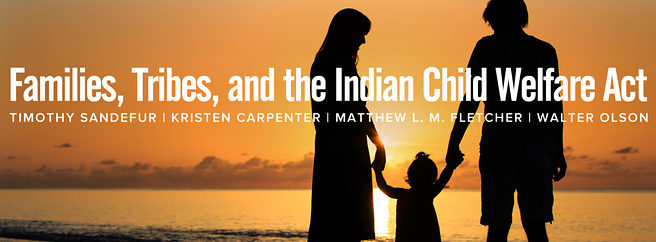Here is “Limit Government Intrusion in Indian Families’ Lives.” This essay is part of a series of online essays at Cato Unbound on the Indian Child Welfare Act.
Excerpts:
The Indian Child Welfare Act (ICWA) restricts government intervention in Indian families’ lives, imposes important obligations on the government that benefit both children and parents when it does interfere, and limits the ease by which private entities profit from government action.And:
Alexandria P. is a story of how foster parents created an adversarial relationship with a child’s family, disregarding the goal of reunification, and then created a perfect storm of anti-Indian media sentiment when they lost. Some facts should be made clear, in case they are not: Lexi knew and regularly visited her Utah family – her sisters and her aunt and uncle – and she always knew she was a foster child. From the beginning, the California foster couple was the only party to contest Lexi’s placement with her relatives. The state of California, the Choctaw Nation, her relatives, her father, and Lexi’s own counsel all agreed that the placement with her relatives was absolutely in her best interest. Not once did any court disagree.Finally:
Casual racism against American Indians is alive and well. In this hostile racial climate, it shouldn’t be surprising that Indian parents in South Dakota argue that “there’s this collective belief that Native people can’t take care of their own children.” The critique that ICWA improperly routes Indian children to their relatives’ homes instead of non-Indian homes is a critique that takes advantage of racial animus against Indian people and comes dangerously close to an allegation that Indian parents and tribal communities are inherently inferior (others have outright denounced the Goldwater Institute’s goals for this reason). Indian people love their children the same as everyone else. ICWA, the gold standard in child welfare, is there to support Indian families against governments that too often devalue them.







No comments:
Post a Comment
Please leave a comment.